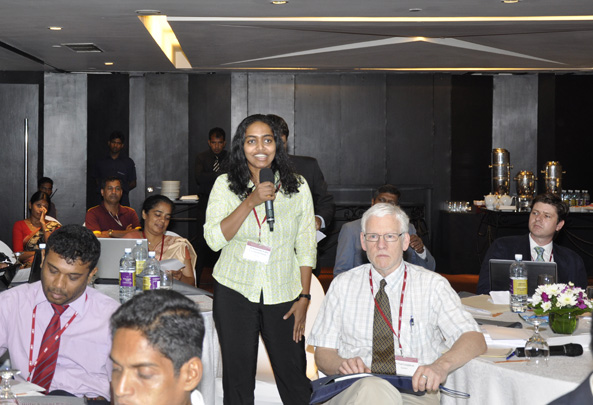
Sri Lanka, Canada team up on wildlife health
Sri Lanka and Canada are a world apart, but thanks to the efforts of veterinary pathologist Dr. Ted Leighton, the two countries share a common goal of managing wildlife health in their regions.
By Lynne Gunville
Leighton is a professor of veterinary pathology at the Western College of Veterinary Medicine (WCVM) as well as the executive director of the Canadian Cooperative Wildlife Health Centre (CCWHC) — a national organization that applies veterinary medical sciences to wildlife conservation and management.
He's been instrumental in helping Sri Lanka to develop its newly established centre for wildlife health management and looks forward to a long-term relationship between the two wildlife health institutions.
"We're operating in kind of a twinning capacity, a relationship in which we serve as a model and a source of expertise and advice while our Sri Lankan colleagues are in the driver's seat and know where they want to go and how they would like us to assist them," explains Leighton, who recently travelled to Sri Lanka where he met with partners involved in the Sri Lanka Wildlife Health Centre (SLWHC).

With the SLWHC now established and beginning to undertake some wildlife disease surveillance activities, the next step will be securing training to help the Sri Lankan veterinarians and others take on new roles and set up additional programs. Leighton is optimistic that they can obtain the necessary resources by working together, and he foresees that the WCVM will be an invaluable source of support.
"Over the next three or four years, we'll make full use of the expertise we have, with people from North America going over to Sri Lanka and with students and professionals coming here to achieve their goals. We anticipate providing training and advice and some support on the diagnostic and scientific research sides – whatever they will need for assistance. We also anticipate that the WCVM will be a major participant."
Those exchanges will include people like Dr. Asha Perera, a graduate student in the WCVM's Department of Veterinary Pathology. She earned a Bachelor of Veterinary Science at Sri Lanka's University of Peradeniya and hopes to return to Sri Lanka to work with the SLWHC on general and targeted wildlife disease surveillance once she completes her graduate work. It will also include participants from the National Wildlife Health Centre in the U.S. which works closely with the CCWHC on international projects.
"The training I obtain on wildlife disease epidemiology, ecology and diagnosis will help immensely with my future contributions to the SLWHC. And the SLWHC will undoubtedly improve the world's understanding of diseases in wild species," explains Perera.
While Leighton expects that Sri Lanka's need for support will diminish over the next five years as the twinning program proceeds, he looks forward to an enduring relationship that will provide learning opportunities for students and researchers from both countries.
"I think that Sri Lanka will be a great place for our students to get a completely different kind of experience in the tropical world, which is a high-risk area for disease emergence. I think there are going to be benefits in both directions. And we'll have a partner institution that we can work with better and better over time."
He's been instrumental in helping Sri Lanka to develop its newly established centre for wildlife health management and looks forward to a long-term relationship between the two wildlife health institutions.
"We're operating in kind of a twinning capacity, a relationship in which we serve as a model and a source of expertise and advice while our Sri Lankan colleagues are in the driver's seat and know where they want to go and how they would like us to assist them," explains Leighton, who recently travelled to Sri Lanka where he met with partners involved in the Sri Lanka Wildlife Health Centre (SLWHC).

With the SLWHC now established and beginning to undertake some wildlife disease surveillance activities, the next step will be securing training to help the Sri Lankan veterinarians and others take on new roles and set up additional programs. Leighton is optimistic that they can obtain the necessary resources by working together, and he foresees that the WCVM will be an invaluable source of support.
"Over the next three or four years, we'll make full use of the expertise we have, with people from North America going over to Sri Lanka and with students and professionals coming here to achieve their goals. We anticipate providing training and advice and some support on the diagnostic and scientific research sides – whatever they will need for assistance. We also anticipate that the WCVM will be a major participant."
Those exchanges will include people like Dr. Asha Perera, a graduate student in the WCVM's Department of Veterinary Pathology. She earned a Bachelor of Veterinary Science at Sri Lanka's University of Peradeniya and hopes to return to Sri Lanka to work with the SLWHC on general and targeted wildlife disease surveillance once she completes her graduate work. It will also include participants from the National Wildlife Health Centre in the U.S. which works closely with the CCWHC on international projects.
"The training I obtain on wildlife disease epidemiology, ecology and diagnosis will help immensely with my future contributions to the SLWHC. And the SLWHC will undoubtedly improve the world's understanding of diseases in wild species," explains Perera.
While Leighton expects that Sri Lanka's need for support will diminish over the next five years as the twinning program proceeds, he looks forward to an enduring relationship that will provide learning opportunities for students and researchers from both countries.
"I think that Sri Lanka will be a great place for our students to get a completely different kind of experience in the tropical world, which is a high-risk area for disease emergence. I think there are going to be benefits in both directions. And we'll have a partner institution that we can work with better and better over time."
